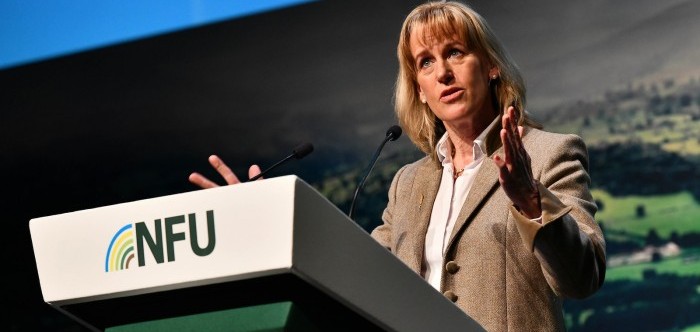NFU President Minette Batters welcomed elements of the new National Food Strategy but stressed that a clear distinction must be made between British meat and cheap imports.
“This food strategy should act as a wake-up call for us all that we need to value the food we eat,” Mrs Batters said. “We need to put balance back in our diet and have a renewed emphasis on eating natural, whole foods; the kind British farmers produce in abundance.
She agreed with the report’s recommendations that we should be supporting everyone to eat more fruit and veg, with more focus on educating our children about valuing and understanding the food they eat and how it has been produced.
But, with the report suggesting the need for a 30% reduction in meat consumption by 2032, she added: “However, it is important that we do not throw meat into one blanket category and that we all make a clear distinction between grass-fed British meat and cheap imports.
“We should be considering British meat in its own category, recognising its sustainability and dense nutritional value. After all, scientific and medical communities agree it is a key part of a healthy, balanced diet, chock full of essential vitamins and minerals.”
“This strategy says major reform is needed of the food system. I would suggest we first look at the actions our government is taking by agreeing to trade deals that welcomes in imported meat in limitless amounts.
“This underlines the importance of domestic, high-quality, traceable food production for the nation’s health and wellbeing and the importance of demonstrating global leadership in this area. This is only something we can do if we all get behind a viable British farming industry. It will never be achieved by exporting our food production more and more to countries which don’t adhere to the same values or production methods.”
Mark Bridgeman, President of the Country Land and Business Association (CLA), welcomed the strategy’s focus on nature friendly farming methods, such as regenerative agriculture, and the need to pioneer new techniques to increase crop yields whilst also protecting the environment are very positive recommendations, and will resonate with many in the farming community.
But he said: “Government must understand the important role livestock plays in environmental management, and it needs to avoid succumbing to the false narrative set by campaign groups that meat is inherently bad. The report rightly recognises the world class environmental and animal welfare standards of British food,” he said.
“It is precisely because of these standards that government and industry can argue with confidence that consumers should buy British meat – as well as other British food – as part of a healthy and environmentally conscious diet.”
Food and Drink Federation Chief Scientific Officer, Kate Halliwell, said: “Food and drink manufacturers welcome the intent to bring forward measures which will help to increase access and affordability of food and drink for children and families on lower incomes.
“In contrast to this, a salt and sugar tax will ultimately impact those families who are already struggling to make ends meet, by making food and drink more expensive. After many years of cost pressures, businesses in our sector are already operating on very tight margins, and any further costs would simply have to be passed on to the consumer in the form of higher food prices.
“These taxes will not drive reformulation. Food and drink manufacturers have been voluntarily lowering fat, salt and sugars in recipes for decades as well as reducing portion size, but it takes time to change much-loved products.”




